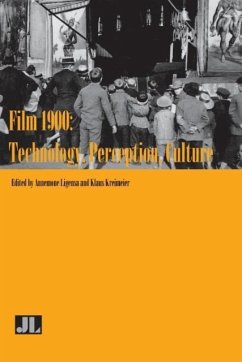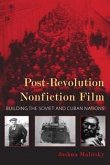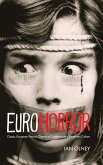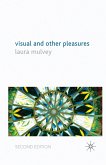Film 1900
Technology, Perception, Culture
Herausgeber: Kreimeier, Klaus; Ligensa, Annemone
26,99 €
inkl. MwSt.
Versandfertig in über 4 Wochen

13 °P sammeln
Film 1900
Technology, Perception, Culture
Herausgeber: Kreimeier, Klaus; Ligensa, Annemone
- Broschiertes Buch
- Merkliste
- Auf die Merkliste
- Bewerten Bewerten
- Teilen
- Produkt teilen
- Produkterinnerung
- Produkterinnerung
The current digital revolution has sparked a renewed interest in the origins and trajectory of modern media, particularly in the years around 1900 when the technology was rapidly developing. This collection aims to broaden our understanding of early cinem
Andere Kunden interessierten sich auch für
![Post-Revolution Nonfiction Film Post-Revolution Nonfiction Film]() Joshua MalitskyPost-Revolution Nonfiction Film61,99 €
Joshua MalitskyPost-Revolution Nonfiction Film61,99 €![Irish Women Playwrights 1900-1939 Irish Women Playwrights 1900-1939]() Cathy LeeneyIrish Women Playwrights 1900-1939104,20 €
Cathy LeeneyIrish Women Playwrights 1900-1939104,20 €![Euro Horror Euro Horror]() Ian OlneyEuro Horror40,99 €
Ian OlneyEuro Horror40,99 €![The Maciste Films of Italian Silent Cinema The Maciste Films of Italian Silent Cinema]() Jacqueline ReichThe Maciste Films of Italian Silent Cinema65,99 €
Jacqueline ReichThe Maciste Films of Italian Silent Cinema65,99 €![Robert de Niro Robert de Niro]() Shawn LevyRobert de Niro26,99 €
Shawn LevyRobert de Niro26,99 €![Visual and Other Pleasures Visual and Other Pleasures]() L. MulveyVisual and Other Pleasures25,99 €
L. MulveyVisual and Other Pleasures25,99 €![The New York Times Book of Movies The New York Times Book of Movies]() The New York Times Book of Movies31,99 €
The New York Times Book of Movies31,99 €-
-
-
The current digital revolution has sparked a renewed interest in the origins and trajectory of modern media, particularly in the years around 1900 when the technology was rapidly developing. This collection aims to broaden our understanding of early cinem
Hinweis: Dieser Artikel kann nur an eine deutsche Lieferadresse ausgeliefert werden.
Hinweis: Dieser Artikel kann nur an eine deutsche Lieferadresse ausgeliefert werden.
Produktdetails
- Produktdetails
- Verlag: Indiana University Press
- Seitenzahl: 256
- Erscheinungstermin: 1. August 2009
- Englisch
- Abmessung: 229mm x 152mm x 14mm
- Gewicht: 379g
- ISBN-13: 9780861966967
- ISBN-10: 0861966961
- Artikelnr.: 25875898
- Herstellerkennzeichnung
- Libri GmbH
- Europaallee 1
- 36244 Bad Hersfeld
- gpsr@libri.de
- Verlag: Indiana University Press
- Seitenzahl: 256
- Erscheinungstermin: 1. August 2009
- Englisch
- Abmessung: 229mm x 152mm x 14mm
- Gewicht: 379g
- ISBN-13: 9780861966967
- ISBN-10: 0861966961
- Artikelnr.: 25875898
- Herstellerkennzeichnung
- Libri GmbH
- Europaallee 1
- 36244 Bad Hersfeld
- gpsr@libri.de
edited by Klaus Kreimeier, Annemone Ligensa
Introduction: Triangulating a Turn: Film 1900 as Technology, Perception and
CultureAnnemone Ligensa
1. Archaeologies of Interactivity: Early Cinema, Narrative and
SpectatorshipThomas Elsaesser
2. Viewing Change, Changing Views: The 'History of Vision'-DebateFrank
Kessler
3. The Ambimodernity of Early Cinema Problems and Paradoxes in the
Film-and-Modernity DiscourseBen Singer
4. Mind, the Gap: The Discovery of Physiological TimeHenning Schmidgen
5. 'Is Everything Relative?': Cinema and the Revolution of Knowledge Around
1900Harro Segeberg
6. The Aesthetic Idealist as Efficiency Engineer: Hugo Munsterberg's
Theories of Perception, Psychotechnics and CinemaJörg Schweinitz
7. Between Observation and Spectatorship: Medicine, Movies and Mass Culture
in Imperial GermanyScott Curtis
8. The Scene of the Crime: Psychiatric Discourse on the Film Audience in
Early Twentieth Century GermanyAndreas Killen
9. Seen Through the Eyes of Simmel: The Cinema Programme as a 'Modern'
ExperienceAndrea Haller
10. 'Under the Sign of the Cinematograph': Urban Mobility and Cinema
Location in Wilhelmine BerlinPelle Snickars
12. Perceptual Environments for Films: The Development of Cinema in
Germany, 1895-1914Joseph Garncarz
12. 'Fumbling Towards Some New Form of Art': The Changing Composition of
Film Programmes in Britain, 1908-1914Ian Christie and John Sedgwick
13. The Attraction of Motion: Modern Representation and the Image of
MovementTom Gunning
14. 'Dashing Down Upon the Audience': Notes on the Genesis of Filmic
PerceptionKlaus Kreimeier
15. German Tonbilder of the 1900s: Advanced Technology and National
BrandMartin Loiperdinger
16. Sculpting with Light: Early Film Style, Stereoscopic Vision and the
Idea of a 'Plastic Art In Motion'Michael Wedel
17. 'A Cinematograph of Feminine Thought': The Dangerous Age, Cinema and
Modern WomenAnnemone Ligensa
14. Cinema as a Mode(l) of Perception: Dorothy Richardson's Novels and
EssaysNicola Glaubitz
Biographies of the Authors
CultureAnnemone Ligensa
1. Archaeologies of Interactivity: Early Cinema, Narrative and
SpectatorshipThomas Elsaesser
2. Viewing Change, Changing Views: The 'History of Vision'-DebateFrank
Kessler
3. The Ambimodernity of Early Cinema Problems and Paradoxes in the
Film-and-Modernity DiscourseBen Singer
4. Mind, the Gap: The Discovery of Physiological TimeHenning Schmidgen
5. 'Is Everything Relative?': Cinema and the Revolution of Knowledge Around
1900Harro Segeberg
6. The Aesthetic Idealist as Efficiency Engineer: Hugo Munsterberg's
Theories of Perception, Psychotechnics and CinemaJörg Schweinitz
7. Between Observation and Spectatorship: Medicine, Movies and Mass Culture
in Imperial GermanyScott Curtis
8. The Scene of the Crime: Psychiatric Discourse on the Film Audience in
Early Twentieth Century GermanyAndreas Killen
9. Seen Through the Eyes of Simmel: The Cinema Programme as a 'Modern'
ExperienceAndrea Haller
10. 'Under the Sign of the Cinematograph': Urban Mobility and Cinema
Location in Wilhelmine BerlinPelle Snickars
12. Perceptual Environments for Films: The Development of Cinema in
Germany, 1895-1914Joseph Garncarz
12. 'Fumbling Towards Some New Form of Art': The Changing Composition of
Film Programmes in Britain, 1908-1914Ian Christie and John Sedgwick
13. The Attraction of Motion: Modern Representation and the Image of
MovementTom Gunning
14. 'Dashing Down Upon the Audience': Notes on the Genesis of Filmic
PerceptionKlaus Kreimeier
15. German Tonbilder of the 1900s: Advanced Technology and National
BrandMartin Loiperdinger
16. Sculpting with Light: Early Film Style, Stereoscopic Vision and the
Idea of a 'Plastic Art In Motion'Michael Wedel
17. 'A Cinematograph of Feminine Thought': The Dangerous Age, Cinema and
Modern WomenAnnemone Ligensa
14. Cinema as a Mode(l) of Perception: Dorothy Richardson's Novels and
EssaysNicola Glaubitz
Biographies of the Authors
Introduction: Triangulating a Turn: Film 1900 as Technology, Perception and
CultureAnnemone Ligensa
1. Archaeologies of Interactivity: Early Cinema, Narrative and
SpectatorshipThomas Elsaesser
2. Viewing Change, Changing Views: The 'History of Vision'-DebateFrank
Kessler
3. The Ambimodernity of Early Cinema Problems and Paradoxes in the
Film-and-Modernity DiscourseBen Singer
4. Mind, the Gap: The Discovery of Physiological TimeHenning Schmidgen
5. 'Is Everything Relative?': Cinema and the Revolution of Knowledge Around
1900Harro Segeberg
6. The Aesthetic Idealist as Efficiency Engineer: Hugo Munsterberg's
Theories of Perception, Psychotechnics and CinemaJörg Schweinitz
7. Between Observation and Spectatorship: Medicine, Movies and Mass Culture
in Imperial GermanyScott Curtis
8. The Scene of the Crime: Psychiatric Discourse on the Film Audience in
Early Twentieth Century GermanyAndreas Killen
9. Seen Through the Eyes of Simmel: The Cinema Programme as a 'Modern'
ExperienceAndrea Haller
10. 'Under the Sign of the Cinematograph': Urban Mobility and Cinema
Location in Wilhelmine BerlinPelle Snickars
12. Perceptual Environments for Films: The Development of Cinema in
Germany, 1895-1914Joseph Garncarz
12. 'Fumbling Towards Some New Form of Art': The Changing Composition of
Film Programmes in Britain, 1908-1914Ian Christie and John Sedgwick
13. The Attraction of Motion: Modern Representation and the Image of
MovementTom Gunning
14. 'Dashing Down Upon the Audience': Notes on the Genesis of Filmic
PerceptionKlaus Kreimeier
15. German Tonbilder of the 1900s: Advanced Technology and National
BrandMartin Loiperdinger
16. Sculpting with Light: Early Film Style, Stereoscopic Vision and the
Idea of a 'Plastic Art In Motion'Michael Wedel
17. 'A Cinematograph of Feminine Thought': The Dangerous Age, Cinema and
Modern WomenAnnemone Ligensa
14. Cinema as a Mode(l) of Perception: Dorothy Richardson's Novels and
EssaysNicola Glaubitz
Biographies of the Authors
CultureAnnemone Ligensa
1. Archaeologies of Interactivity: Early Cinema, Narrative and
SpectatorshipThomas Elsaesser
2. Viewing Change, Changing Views: The 'History of Vision'-DebateFrank
Kessler
3. The Ambimodernity of Early Cinema Problems and Paradoxes in the
Film-and-Modernity DiscourseBen Singer
4. Mind, the Gap: The Discovery of Physiological TimeHenning Schmidgen
5. 'Is Everything Relative?': Cinema and the Revolution of Knowledge Around
1900Harro Segeberg
6. The Aesthetic Idealist as Efficiency Engineer: Hugo Munsterberg's
Theories of Perception, Psychotechnics and CinemaJörg Schweinitz
7. Between Observation and Spectatorship: Medicine, Movies and Mass Culture
in Imperial GermanyScott Curtis
8. The Scene of the Crime: Psychiatric Discourse on the Film Audience in
Early Twentieth Century GermanyAndreas Killen
9. Seen Through the Eyes of Simmel: The Cinema Programme as a 'Modern'
ExperienceAndrea Haller
10. 'Under the Sign of the Cinematograph': Urban Mobility and Cinema
Location in Wilhelmine BerlinPelle Snickars
12. Perceptual Environments for Films: The Development of Cinema in
Germany, 1895-1914Joseph Garncarz
12. 'Fumbling Towards Some New Form of Art': The Changing Composition of
Film Programmes in Britain, 1908-1914Ian Christie and John Sedgwick
13. The Attraction of Motion: Modern Representation and the Image of
MovementTom Gunning
14. 'Dashing Down Upon the Audience': Notes on the Genesis of Filmic
PerceptionKlaus Kreimeier
15. German Tonbilder of the 1900s: Advanced Technology and National
BrandMartin Loiperdinger
16. Sculpting with Light: Early Film Style, Stereoscopic Vision and the
Idea of a 'Plastic Art In Motion'Michael Wedel
17. 'A Cinematograph of Feminine Thought': The Dangerous Age, Cinema and
Modern WomenAnnemone Ligensa
14. Cinema as a Mode(l) of Perception: Dorothy Richardson's Novels and
EssaysNicola Glaubitz
Biographies of the Authors







